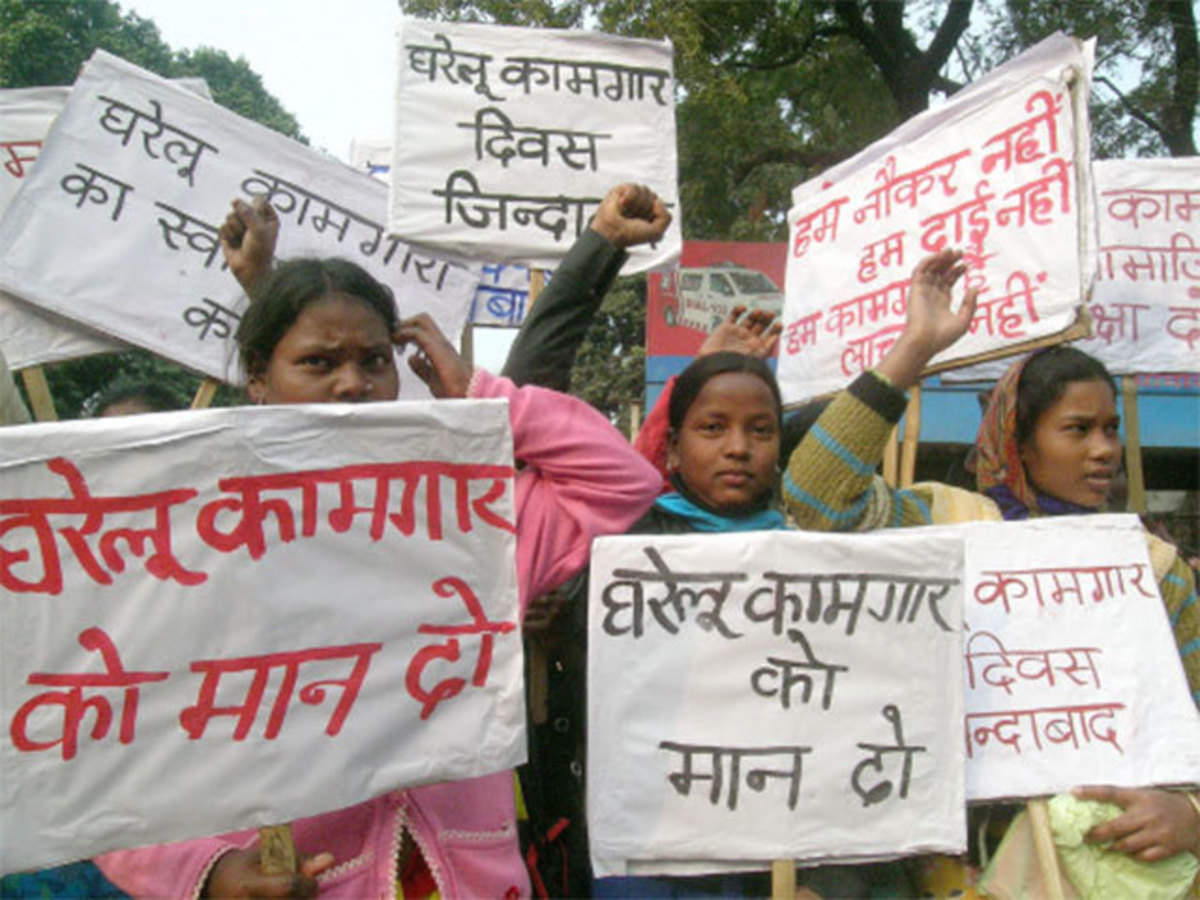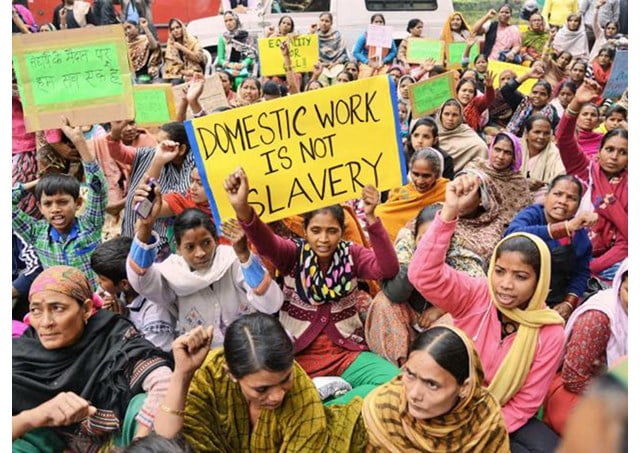Editor’s Note: FII’s #MoodOfTheMonth for May, 2022 is Gender at Workplaces. We invite submissions on the many layers of this theme throughout the month. If you’d like to contribute, kindly refer to our submission guidelines and email your articles to sukanya@feminisminindia.com
Many households, especially the more economically affluent and urban ones, rely on domestic workers. The International Labour Organisation characterises domestic workers as workers who perform domestic work for pay and remuneration. These workers perform arduous tasks, which can include cooking, washing clothes, sweeping, cleaning, childcare, driving, security, etc. These tasks often have a gendered assignment within a household, and exporting these tasks to external sources, reflects those gender dynamics.
Domestic work entails one of the most significant employment avenues for women in India. According to National Sample Survey Office (2012), India has 39 lakh people employed as domestic workers, out of which at least 26 lakh are women. However, the lack of legislation and the socio-economic dynamics within these spaces have resulted in high informalisation of this work.
While domestic work has always observed a demand, the spike in domestic workers in the recent decade has been amplified by increasing industrialisation, shrinkage in agricultural employment, and rapid urbanisation. These workers, especially women, have observed a reduction in their traditional income sources (mainly agriculture), and lack transferable skills to work in other sectors. There is a surplus of female workers without adequate education and skills, who seek better sources of income in cities and are often absorbed into the informal economy, especially in the expanding services sectors, which includes domestic work.
The informal economy captures a significant slice of the global market, especially in the emerging economies. South Asian countries are particularly characterised by large-scale informal employment, the highest among emerging economy regions in the world, about two-fifths of the world total.

A majority of domestic workers also belong to the oppressed castes and are often employed by members of the dominant castes. Notions of purity and pollution influence their treatment at work, and the kind of tasks allocated to them. These caste-based dynamics are evident, such as the provision of separate utensils, separate or no water facilities, denial of the use of furniture or toilet facilities, provision of stale food, etc. All these are examples of daily humiliations and indignities domestic workers are forced to face
Domestic work offers easy employment opportunities to women who might seek to augment their income, or otherwise lack sources of income, due to a lack of qualifications and skills as well as discriminatory barriers in other employment avenues. However, its highly informal, deregulated, and unorganised nature creates conditions unfavourable to the workers, especially women and individuals from other marginalised social locations.
The domestic worker often faces poor working conditions, and low wages and is subject to exploitation, routine harassment, and abuse. With the overwhelming number of women in this category, tied to the isolating nature of the work, without the ability to unionise or belong to organisations, and reliant on word of mouth, domestic workers, especially women in private homes are also vulnerable to sexual abuse, with few means for recourse.
Private households are not recognised as work establishments bound by labour laws. The same kind of work performed at an establishment like a school or factory is considered work bound by labour laws, yet domestic workers do not receive the same recognition. Domestic work can be highly fragmented, with workers often employed on a part-time basis in multiple households, which makes it difficult for existing legislation to cover.
Moreover, domestic workers do not have a specific set of hours of work, thus, with no strict adherence to minimum daily wage and working hours. However, the total amount of hours they put in can equate to or be greater than, for example, the number of hours a full-time factory employee works.
Also read: Caste And Gender In Paid Domestic Work In India

A majority of domestic workers also belong to the oppressed castes and are often employed by members of the dominant castes. Notions of purity and pollution influence their treatment at work, and the kind of tasks allocated to them. These caste-based dynamics are evident, such as the provision of separate utensils, separate or no water facilities, denial of the use of furniture or toilet facilities, provision of stale food, etc. All these are examples of daily humiliations and indignities domestic workers are forced to face.
Household work is devalued and that is reflected in the pay for such work, especially due to high labour competition. Moreover, it is also stigmatised, where having to clean another person’s house is considered impure and looked down upon since it is often driven by necessity rather than choice. Yet, those who look down upon such work seek out such workers to labour in their households.
Comprehensive legislature encompassing the varied nature of domestic work is crucial. There is a need for regulation and monitoring to reduce the possibility of exploitation and allow means of recourse for the workers. Provisions to aid the unionisation and organisation of domestic workers are necessary, to allow for greater collective bargaining power, regulate wages, argue against unfair dismissal, and improve job security
The unorganised nature of work, reliance on word of mouth, and the bargaining power of the employer leave domestic workers vulnerable to exploitation and income insecurity. For example, a personal account by a domestic worker stated a common occurrence in their work. Often, when an employer decides to travel or take a holiday, they do not get paid for that period of time, and yet are expected to immediately start work once they return.
This indicates a devaluation of their work tied to the informal nature of the arrangement as well as a dismissal of household work. Job opportunities are few, inequalities are high, and competition for labour is plentiful, leaving workers with little recourse. In other instances, workers have often faced accusations of theft, especially among employers who do not wish their dues. Domestic workers often have too little bargaining power and are subject to the whims of their employees.

Comprehensive legislature encompassing the varied nature of domestic work is crucial. There is a need for regulation and monitoring to reduce the possibility of exploitation and allow means of recourse for the workers. Provisions to aid the unionisation and organisation of domestic workers are necessary, to allow for greater collective bargaining power, regulate wages, argue against unfair dismissal, and improve job security.
Moreover, linking such legislature to social protection schemes is essential, as highlighted during the COivid-19 pandemic, where thousands of workers were forced to survive without income for months.
Most importantly, there is a need to recognise domestic work as dignified work, both in the paid and unpaid sphere, and recognise the culpability of those who employ domestic workers. Such exploitative practices should not be considered the norm, and individual households that employ domestic workers hold a strong measure of responsibility to treat them with dignity and support their rights.
Also read: Domestic Workers & Covid-19: Lessons In Dignity That Must Be Learnt
Featured Image Source: UCA News
About the author(s)
Aradhana Choudhury is an aspiring policymaker. She is currently pursuing herMaster’s in International Development and is seeking to apply intersectional learningto development strategies. She has a keen interest in development research, policyanalysis, and gender. She hopes to support tangible impacts towards gender equalityand equity, with community participation at the forefront.Aradhana also has a keen interest in history and heritage studies and has worked toexpand the interest of general audiences in the history of a place




